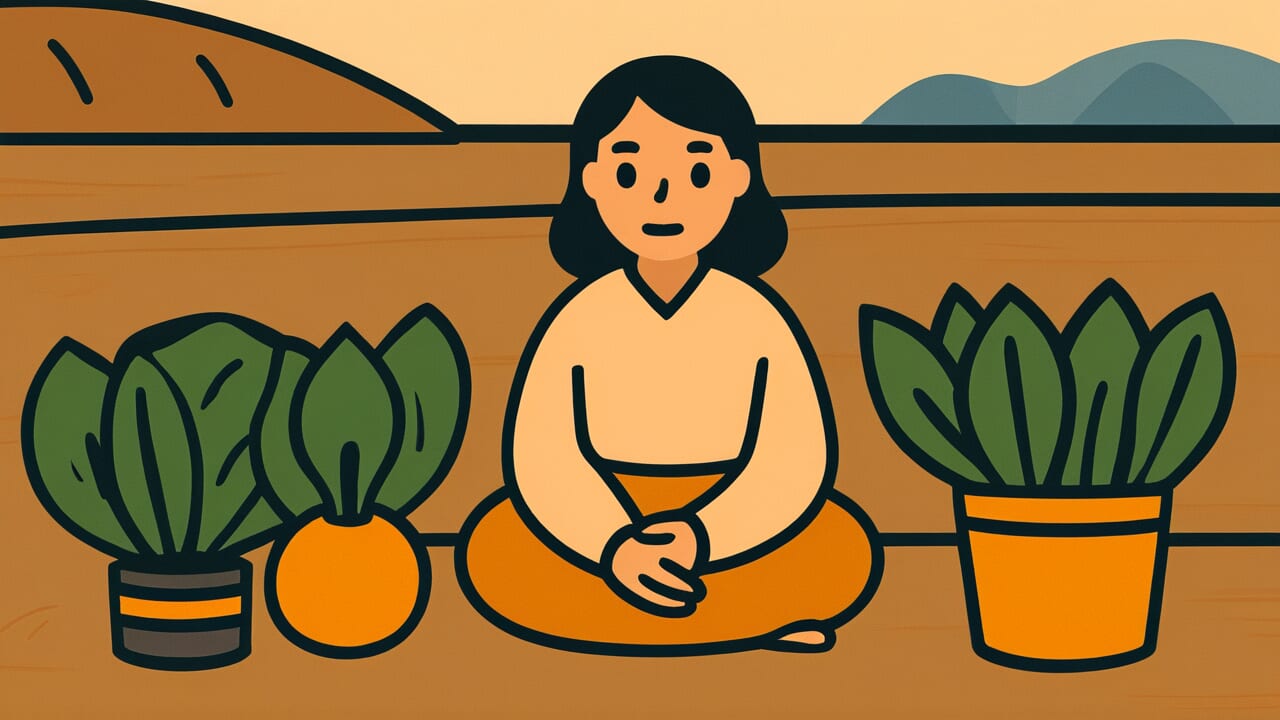How to Read “穏座の初物”
onza no hatsumono
Meaning of “穏座の初物”
“穏座の初物” is a metaphor for gaining benefits or advantages easily, like receiving the first seasonal foods while just sitting down.
Normally, you need to work hard or make an effort to obtain something valuable. But this proverb describes a situation where you get good things without any effort at all.
You just sit there and wait for someone to bring you the first seasonal foods. You don’t go to the market to buy them. You don’t harvest them from the field yourself.
This proverb is used to describe situations where good fortune falls into your lap unexpectedly. It can also describe using connections or position to gain benefits without struggle.
People often use it to express envy of such situations. Sometimes it carries a sarcastic tone about gaining advantages without effort.
Even today, this expression fits perfectly when you see someone getting good results without working for them.
Origin and Etymology
The origin of “穏座の初物” has no clear documented record. However, the components of the phrase reveal an interesting background.
“Onza” means sitting calmly and peacefully. It describes sitting comfortably without making any effort.
“Hatsumono” refers to the first harvest of vegetables or fruits in a season. It also means the first catch of fish.
In Japan, people have long believed that eating hatsumono extends your life by 75 days. Hatsumono was considered very auspicious.
Because of this, hatsumono was valued as a gift. People had a custom of giving it to close friends or superiors.
This proverb likely expresses the scene of receiving such valuable hatsumono as a gift while sitting. You don’t work hard to obtain it yourself.
During the Edo period, merchants and craftsmen supposedly used this phrase. They expressed sarcasm or envy toward situations where people gained profit without struggle.
In Japanese culture, which values hard work, this phrase may contain complex feelings about gaining benefits easily.
Interesting Facts
There’s a saying “hatsumono seventy-five days” about first seasonal foods. People believed eating hatsumono would extend your life by 75 days.
During the Edo period, the first bonito of the season was especially prized. A saying emerged: “Pawn your wife to buy the first bonito.”
This shows how much people valued hatsumono. So receiving such precious hatsumono while just sitting shows how much this proverb represents “gaining without effort.”
The word “onza” itself reminds us of the calm sitting posture in Buddhist zazen meditation. But interestingly, this proverb means the opposite of spiritual practice.
It refers to just sitting and doing nothing at all.
Usage Examples
- He got into a major company through his parents’ connections. That’s truly 穏座の初物.
- Getting an inheritance without any effort is exactly what 穏座の初物 means.
Universal Wisdom
The proverb “穏座の初物” raises deep questions about fairness and the value of effort in human society.
Why do people feel complicated emotions when they see someone gaining benefits easily? It’s because humans instinctively feel there should be a proper relationship between effort and reward.
People who work hard should be rewarded. Those who struggle should gain results. This is our basic sense of fairness.
Society functions because this sense exists.
However, reality often shows that effort and reward don’t always match. Your birth environment, chance encounters, and good timing all play roles.
These factors unrelated to your effort can greatly influence life outcomes. This proverb has been passed down because it expresses honest human feelings about such unfairness.
At the same time, this proverb contains not just envy but also self-reflection. Our ancestors knew the truth that things gained easily don’t bring real fulfillment or achievement.
Hatsumono you obtain by walking with your own feet is far more valuable and delicious than hatsumono received while sitting.
The process of effort makes people grow and gives true value to what they gain. This timeless wisdom is embedded here.
When AI Hears This
Humans tend to choose 100,000 yen today over 1 million yen in the future. This is called hyperbolic discounting.
Buying hatsumono at high prices is an extreme example of this cognitive trait. Why did Edo people pay large sums when waiting a month would halve the price?
Because the value of “eating it right now” decreases rapidly over time.
Interestingly, this behavior wasn’t mere waste but actually a calculated investment. Information about eating hatsumono became a powerful social signal in Edo.
It efficiently communicated the message “I have economic resources” to others. Considering this information transmission’s cost-performance, buying expensive hatsumono was surprisingly rational.
Think about modern social media and it becomes clear. Posting a new product before anyone else gets many reactions.
The same post a week later gets far fewer responses. The value of scarcity decreases exponentially over time.
The high price paid for hatsumono reflects humanity’s intuitive understanding of this rapid value decay curve. Our brains instinctively grasp the value peak created by multiplying scarcity and time.
Lessons for Today
“穏座の初物” teaches us the importance of process.
Modern society emphasizes efficiency and time-saving. Getting results with minimal effort seems like smart living.
But this proverb makes us stop and think. Is only the result truly valuable?
Experience gained through effort, wisdom learned from trial and error, and the sense of achievement from overcoming difficulties are irreplaceable treasures.
You cannot receive these while sitting down. Things obtained easily are hard to fully appreciate or cherish.
Of course, luck and timing matter in life. But rather than just waiting for them, we should choose to stand on our own feet.
Move your hands. Break a sweat. What you obtain through your own power will shine much brighter than 穏座の初物, no matter how small.
The process of effort itself makes you grow and gives you strength for the next challenge.



Comments